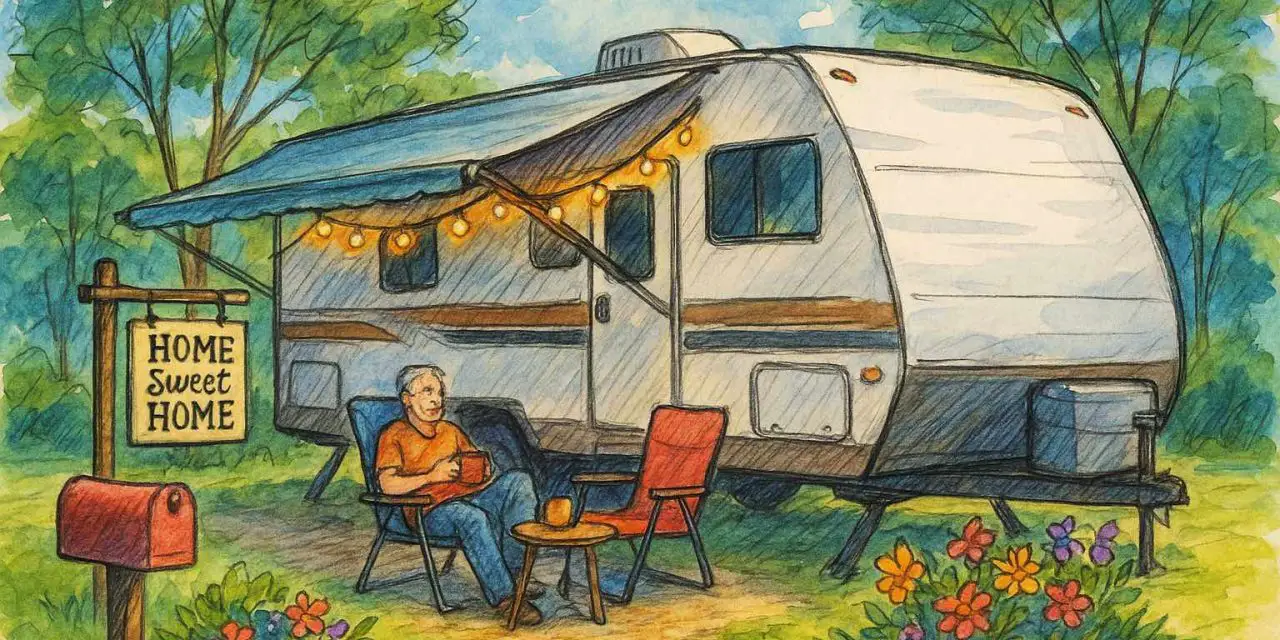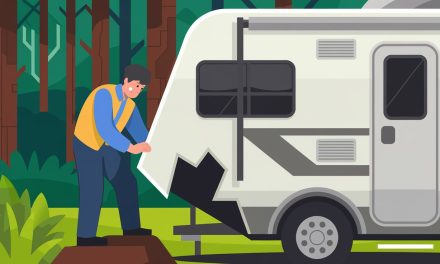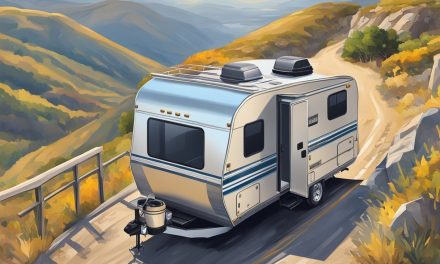Have you ever looked at your cozy RV and wondered, “Can an RV be a permanent residence?” You’re not alone! With rising housing costs and the growing appeal of minimalist living, more Americans are asking this exact question. The simple answer is: yes, but with important catches.
Living permanently in an RV isn’t just about parking wherever you want and calling it home. There are legal hoops to jump through, zoning laws to understand, and practical challenges to overcome. But don’t worry – thousands of Americans have successfully made their RV their permanent home, and with the right knowledge, you can too.
Whether you’re dreaming of downsizing your life, escaping high rent payments, or simply craving the freedom of the open road, this guide will walk you through everything you need to know about RV permanent residency. We’ll break down the legal requirements, explore the best states for RV living, and give you the honest truth about what it’s really like to call your RV “home.”
1. The Legal Reality: What “Permanent Residence” Actually Means for RV Owners
Here’s the thing that catches most people off guard: RVs are classified as vehicles, not homes, by the U.S. Department of Housing and Urban Development (HUD). This means you can’t just register your RV as a permanent dwelling like you would a house or apartment.
However, that doesn’t mean you can’t live in your RV full-time! According to recent statistics, approximately 1 million Americans currently live in their RVs full-time with no other form of housing. The key is understanding the difference between your RV being your permanent residence and having a legal permanent address.
You’ll need to establish domicile in a state – basically, a legal “home base” where you pay taxes, vote, and receive mail. Many full-time RVers choose states like Florida, Texas, or South Dakota because they have no state income tax and RV-friendly policies. This legal address doesn’t have to be where your RV is parked, but it needs to be a real, physical address.
The process typically involves getting a driver’s license in your chosen state, registering to vote, and setting up mail forwarding services. Some states make this easier than others – Florida, for example, allows you to use a mail forwarding service address as your legal domicile.
Reality check: It’s like being a legal nomad – you need a “home” on paper even though your real home has wheels and gets 8 miles per gallon!
Would you like to save this article?
How to Get Mail & Change Domicile as a Full Time RVer
2. State-by-State Breakdown: Where RV Living is Actually Legal
Not all states treat RV residents equally! Some states roll out the red carpet for RV living, while others make it nearly impossible. Here’s what you need to know:
RV-Friendly States:
- California: You can stay indefinitely as long as you don’t create health hazards
- Florida: No state income tax, easy domicile establishment
- Texas: No state income tax, lots of RV parks
- Arizona: Excellent weather, large RV communities
- Nevada: No state income tax, relaxed regulations
Restrictive States:
- New York: Technically considers full-time RV living illegal in many areas
- New Jersey: Strict zoning laws make it difficult
- Massachusetts: Limited options for legal RV parking
The reality is that local zoning laws often matter more than state laws. Even in RV-friendly states, some cities and counties have restrictions. For example, you might be able to live in your RV in rural California but not in downtown San Francisco.
Important note: About 62% of RV owners replace their RVs every 2-5 years, so factor in vehicle costs when planning your permanent move.
| State | Income Tax | RV Friendliness | Domicile Ease |
|---|---|---|---|
| Florida | None | High | Very Easy |
| Texas | None | High | Easy |
| California | High | Medium | Medium |
| New York | High | Low | Difficult |
The truth is: Choosing a state for RV living is like dating – some are high-maintenance (looking at you, New York), while others are chill and let you be yourself (hello, Florida)!
3. The Money Talk: Real Costs of RV Permanent Living
Let’s talk numbers because living in an RV full-time isn’t automatically cheaper than traditional housing. While you might save on rent, you’ll have unique expenses that house-dwellers don’t face.
Monthly RV Living Costs:
- Campground fees: $300-$1,200 per month
- Fuel costs: $200-$600 per month (if traveling)
- Insurance: $100-$300 per month
- Maintenance/repairs: $150-$400 per month
- Utilities (when not included): $50-$150 per month
According to Progressive Insurance, RV ownership has increased 62% over the last 20 years, with 11.2 million households now owning RVs. This surge in popularity has led to increased campground costs in many areas.
Hidden costs people forget:
- Propane refills: $20-$40 monthly
- Laundromat visits: $40-$80 monthly
- Storage units: $50-$200 monthly (for extra belongings)
- Vehicle registration in multiple states: $100-$500 annually
The good news? Half of RV owners are employed full-time, proving that you can maintain a career while living the RV lifestyle. Remote work has made this even easier, with 24% of RV owners being retired and enjoying their golden years on the road.
Honest reality: RV living is like that friend who seems super low-maintenance until you realize they need constant attention – sure, no mortgage, but your house literally needs an oil change!
Watch Before You Start Full-Time RV Living – Real Costs Revealed
4. Zoning Laws and Local Regulations: The Make-or-Break Factor
Here’s where things get tricky: local zoning laws can override state permissions. You might be in an RV-friendly state, but if the local city or county says “no long-term RV parking,” you’re out of luck.
Common zoning restrictions:
- Residential zones: Often prohibit RV living entirely
- Commercial zones: May allow RV parks but not individual RVs
- Agricultural zones: Sometimes more lenient for RV living
- Recreational zones: Usually designed for temporary camping only
The 14-day rule is common on public lands – you can park for up to 14 days, then must move at least 25 miles away. This works for travelers but makes permanent residence challenging.
What to research before settling anywhere:
- County zoning ordinances
- City municipal codes
- HOA restrictions (if applicable)
- Utility hookup availability
- Septic and sewage regulations
Some areas require RVs to be connected to approved septic systems, have permanent utility connections, or meet specific safety standards to be considered legal residences. Over 40 million Americans regularly go RVing, but not all of them understand these local nuances.
Pro tip: Contact local building departments before settling in an area. They can tell you exactly what’s required for legal RV living in that jurisdiction.
The reality: Zoning laws are like that overly complicated board game – everyone has different rules, nobody explains them clearly, and just when you think you understand, someone pulls out a rulebook you’ve never seen!
5. Setting Up Your RV as a Legal Permanent Address
Making your RV your official address requires more than just parking it somewhere pretty. You need to establish what’s called domicile – your legal home base for taxes, voting, and official documents.
Essential steps for RV domicile:
• Choose your domicile state (Florida, Texas, and South Dakota are popular) • Get a physical address (mail forwarding service, friend’s address, or RV park) • Obtain a driver’s license in your chosen state • Register to vote in your new state • Update voter registration and all official documents • Set up mail forwarding through USPS or private services
Popular mail forwarding services:
- Americas Mailbox (South Dakota)
- Escapees RV Club (Texas)
- Good Sam Mail Service (Florida)
- MyRVMail (multiple states)
These services provide you with a real street address and forward your mail to wherever you’re parked. Some even scan mail and email it to you digitally!
Required documents for domicile change:
- Birth certificate or passport
- Social Security card
- Previous state’s driver’s license
- Proof of address (utility bill, lease, etc.)
- RV registration and insurance
The “intent to remain” rule is crucial – you need to demonstrate that you intend this state to be your permanent home, even if you’re traveling. This includes changing bank accounts, updating insurance policies, and filing taxes in your new state.
What it’s really like: Establishing domicile is like breaking up with your old state and making it Facebook official with your new one – lots of paperwork, some awkward conversations, and everyone wants to know why you’re making this change!
6. Insurance and Healthcare: Protecting Your Mobile Home
RV insurance for permanent residents is different from vacation RV coverage. You’ll need specialized policies that account for full-time living, and costs typically range from $100-$300 per month depending on your RV’s value and coverage level.
Full-time RV insurance typically covers:
- Liability coverage (required by law)
- Comprehensive coverage (weather, theft, vandalism)
- Collision coverage (accidents and rollovers)
- Personal property (your belongings inside)
- Emergency expenses (lodging if RV is damaged)
- Vacation liability (if someone gets hurt at your campsite)
Healthcare challenges for RV residents: Finding healthcare providers while constantly moving can be tricky. Many full-time RVers choose national health networks or telemedicine services that work across state lines.
Popular healthcare solutions:
- National PPO plans with broad provider networks
- Telemedicine subscriptions for routine consultations
- Urgent care chains with nationwide locations
- Good Sam Travel Assist for emergency medical transportation
Prescription medications can be challenging when you’re always moving. Many RVers use mail-order pharmacies or nationwide chains like CVS or Walgreens that can transfer prescriptions easily.
Medicare considerations: If you’re 65+ and using Medicare, make sure your chosen domicile state has good Medicare Advantage options, as these plans are location-specific.
The honest truth: RV insurance is like regular car insurance’s overachieving sibling – it covers everything your car insurance does, plus it needs to worry about your home getting stolen, flooded, or accidentally driven into a low bridge by someone who “swore it would fit!”
7. Internet, Work, and Staying Connected on the Road
Working remotely from your RV is totally doable, but it requires planning. With reliable internet becoming more accessible, many RVers maintain full-time careers while living on the road.
Internet solutions for RV living:
- Cellular hotspots: Verizon, AT&T, T-Mobile plans
- Satellite internet: Starlink, HughesNet
- Wi-Fi boosters: WeBoost, SureCall amplifiers
- Campground Wi-Fi: Often slow but free
Data usage reality check:
- Video calls: 1-3 GB per hour
- Streaming: 1-7 GB per hour (depending on quality)
- General browsing: 1-5 GB per month
- Email and messaging: Under 1 GB per month
Most successful RV remote workers use multiple internet sources as backup. A typical setup might include unlimited cellular data, Starlink satellite, and campground Wi-Fi as a tertiary option.
Best careers for RV living:
- Software development and IT
- Digital marketing and social media
- Writing and content creation
- Online education and tutoring
- Consulting and freelancing
- E-commerce and online sales
Workspace setup tips:
- Invest in ergonomic furniture (your back will thank you)
- Create dedicated work zones separate from living areas
- Use noise-canceling headphones for calls
- Install good lighting for video conferences
According to recent surveys, 54% of RV owners have childhood experience with camping, making the transition to RV living feel more natural for many.
Reality check: Working from an RV is like being a digital nomad with commitment issues – you get all the freedom of remote work, but your office literally drives away if you don’t like your neighbors!
Living Stationary in an RV: Tips for Full-Time RV Life
Conclusion: Is RV Permanent Living Right for You?
Can an RV be a permanent residence? Absolutely! But it’s not as simple as buying an RV and hitting the road. You’ll need to navigate legal requirements, establish domicile, manage ongoing costs, and adapt to a completely different lifestyle.
The bottom line: RV permanent living works best for people who are flexible, adaptable, and willing to embrace minimalism. You’ll trade space and stability for freedom and adventure. Some days you’ll wake up to mountain views, other days you’ll be troubleshooting your water pump in a Walmart parking lot.
Current statistics show that as of 2022, 3.1 million Americans live full-time in vans, RVs, and other converted vehicles – a number that’s risen 63% in recent years. This isn’t just a trend; it’s become a legitimate lifestyle choice for people seeking alternatives to traditional housing.
Before you make the leap, honestly assess:
- Your tolerance for small spaces
- Your mechanical aptitude (things break!)
- Your financial flexibility
- Your social needs (RV living can be isolating)
- Your work situation (remote work makes it easier)
The RV lifestyle isn’t for everyone, but for those who embrace it, it offers unparalleled freedom and the chance to wake up somewhere new whenever you want. Just remember: your home will need gas, your address will be complicated, and you’ll become really good friends with your local RV repair shop!
Sources:
- https://www.emergencyassistanceplus.com/resources/rv-statistics/
- https://www.rvdoctor.org/blog/what-states-allow-you-to-live-in-an-rv/
- https://nonprofitquarterly.org/americans-living-in-rvs-cope-with-climate-change/
- https://www.condorferries.co.uk/rv-statistics
- https://www.progressive.com/resources/insights/living-in-an-rv/
- https://www.rvia.org/2025-go-rving-rv-owner-demographic-profile
- https://roadtrippers.com/magazine/your-guide-to-full-time-rv-living/
- https://rvshare.com/blog/state-residency/
- https://www.thetravelingelms.com/what-states-allow-you-to-live-in-an-rv/
- https://www.escapees.com/blog/establishing-domicile-for-rvers







